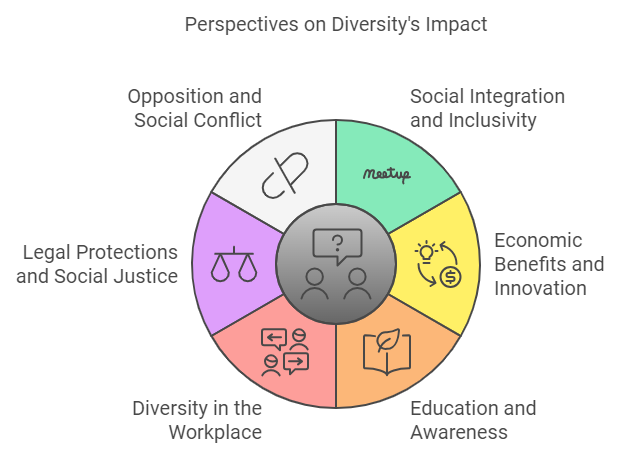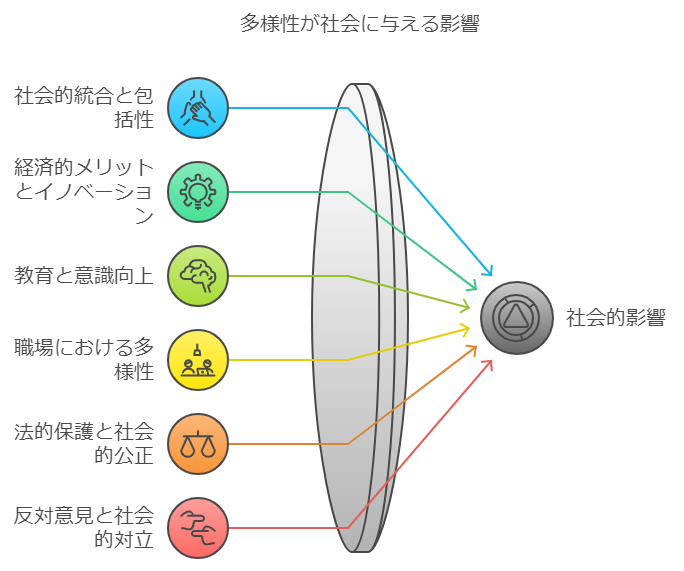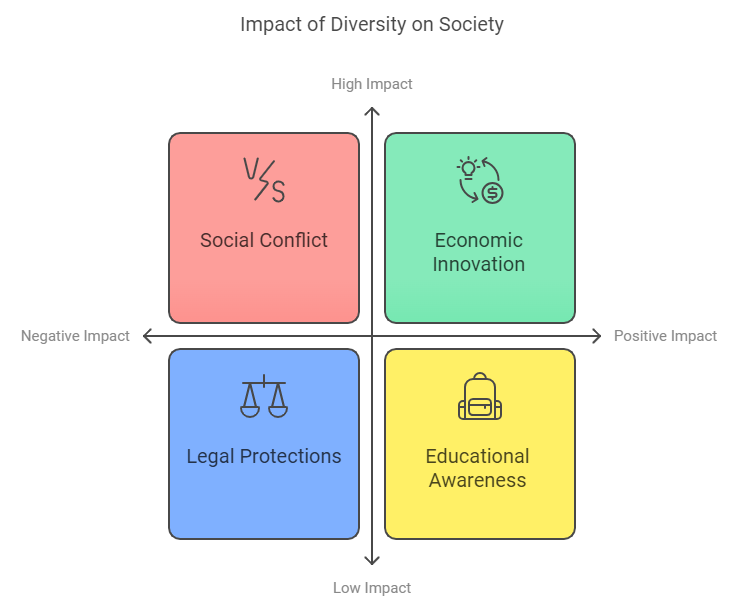(簡単★~難しい★★★★★)語彙難易度★★★★

目次
Question: Is diversity always beneficial for society?
(多様性は常に社会にとって有益でしょうか?)
トレーニング手順
200~240語程度、3つの観点、目標解答時間:約25分
- 分野・トピック毎の観点とキーワードをまとめる
以下の画像のようなイメージ図にしておくと、記憶に定着するのでおススメ - 自分が書きやすい立場・観点で実際に書く
分からない表現はすぐに調べて15分程度で書く - 続いて、先ほどとは反対意見で書いてみる
分からない表現はすぐに調べて15分程度で書く - そのトピックについて実際に誰かと話す、又は1分スピーチをする
- 同じ分野で3つくらいの意見論述を作成する
例えば、宇宙なら宇宙植民・宇宙採掘・宇宙旅行など
6つの観点 (Perspectives)
単純化したイラストで整理することで、記憶に定着しやすくなります。

観点 (Perspectives)
- 社会的統合と包括性 (Social Integration and Inclusivity)
- 多様性は、さまざまな背景や文化、アイデンティティを持つ人々を社会に統合し、すべての人が平等に受け入れられる環境を作り出します。
- 経済的メリットとイノベーション (Economic Benefits and Innovation)
- 多様な視点が組織や社会に新しいアイデアをもたらし、イノベーションを促進するため、経済的成長に貢献します。
- 教育と意識向上 (Education and Awareness)
- 多様性についての教育は、他者を理解し、異なる文化や価値観を尊重するために重要です。また、偏見や差別を減らすためにも役立ちます。
- 職場における多様性 (Diversity in the Workplace)
- 企業が多様性を尊重することで、より創造的で柔軟な職場環境が形成され、従業員の満足度や生産性が向上します。
- 法的保護と社会的公正 (Legal Protections and Social Justice)
- 多様性の尊重は、人種、性別、性的指向、宗教、障害などの違いに対する差別を防ぐための法的保護と、社会的公正を実現する手段です。
- 反対意見と社会的対立 (Opposition and Social Conflict)
- 多様性の推進は、伝統的な価値観や均質な文化を維持したいと考える人々からの抵抗を引き起こすこともあり、社会的対立が生じる場合があります。
キーワード (Keywords)
- plurality (多元性)
- inclusiveness (包括性)
- cultural competence (文化的適応力)
- ingenuity (独創性)
- meritocracy (実力主義)
- egalitarianism (平等主義)
- systemic discrimination (制度的差別)
- intersectionality (相互交差性)
- representation equity (代表性の公平性)
- heterogeneity (異質性)
使われそうな動詞 (Verbs)
- encompass (包み込む)
- facilitate (容易にする)
- cultivate (育成する)
- accommodate (順応させる)
- diversify (多様化する)
- advocate (支持する)
- dismantle (解体する)
- amplify (拡大する)
- bridge (橋渡しをする)
- counteract (対抗する)
使われそうな形容詞 (Adjectives)
- multifaceted (多面的な)
- integrative (統合的な)
- reciprocal (相互の)
- heterogeneous (異質な)
- equitable (公平な)
- forward-thinking (先見的な)
- underrepresented (過小評価された)
- intersectional (交差的な)
- meritocratic (実力主義の)
- disproportionate (不均衡な)
使われそうな副詞 (Adverbs)
- comprehensively (包括的に)
- proportionately (比例して)
- empathetically (共感的に)
- systematically (体系的に)
- symbiotically (共生的に)
- substantively (本質的に)
- progressively (進歩的に)
- deliberately (意図的に)
- mutually (相互に)
- disproportionately (不均衡に)

Yes: 多様性は常に社会に有益だ
Diversity is highly advantageous for society, as it promotes social cohesion, fosters economic growth through innovation, and enhances education and awareness. These elements make diversity an essential component for societal advancement.
First, diversity encourages social integration and inclusivity. By embracing individuals from various cultural, ethnic, and identity backgrounds, society becomes more welcoming, creating an environment where all individuals feel respected and valued. This inclusivity strengthens social cohesion, allowing people from different walks of life to contribute equally, thereby fostering a more harmonious and united community.
Second, diversity generates substantial economic benefits and drives innovation. When individuals with diverse perspectives and experiences collaborate, they bring forth novel ideas and creative solutions. This diversity of thought is invaluable in industries like technology and business, where innovation is vital for staying competitive. Societies and organizations that embrace diversity are better positioned to adapt to changes and achieve sustained economic success.
Lastly, diversity plays a crucial role in education and raising awareness. Exposure to different cultures, beliefs, and viewpoints cultivates empathy and mutual respect. This increased understanding helps to reduce prejudice and discrimination, fostering a more tolerant and open-minded society. Promoting diversity also encourages critical thinking, which is essential for addressing global challenges in an interconnected world.
In conclusion, diversity enriches social integration, stimulates innovation, and promotes education, making it a powerful driver for societal progress. Its advantages far outweigh the challenges, making it a cornerstone of a more inclusive, innovative, and compassionate world. (240 words)
賛成意見の訳と用語
Diversity is highly advantageous for society, as it promotes social cohesion, fosters economic growth through innovation, and enhances education and awareness. These elements make diversity an essential component for societal advancement.
イントロ:
多様性は社会にとって非常に有益であり、社会的統合を促進し、イノベーションを通じて経済成長を促し、教育と意識向上を高める。これらの要素は、社会の進歩において多様性が不可欠であることを示している。
- “highly advantageous”(非常に有益)
類語: “beneficial,” “favorable”
反語: “disadvantageous,” “harmful” - “societal advancement”(社会の進歩)
類語: “social progress,” “societal development”
反語: “societal stagnation,” “social decline” - “essential component”(不可欠な要素)
類語: “crucial element,” “vital part”
反語: “non-essential part,” “optional element”
First, diversity encourages social integration and inclusivity. By embracing individuals from various cultural, ethnic, and identity backgrounds, society becomes more welcoming, creating an environment where all individuals feel respected and valued. This inclusivity strengthens social cohesion, allowing people from different walks of life to contribute equally, thereby fostering a more harmonious and united community.
ボディ1: 社会的統合と包摂性を促進
まず、多様性は社会的統合と包摂性を促進する。 多様な文化的、民族的、アイデンティティを持つ個人を受け入れることで、社会はより受容的になり、すべての人々が尊重され、価値を感じられる環境が生まれる。この包摂性は社会的結束を強化し、さまざまな背景を持つ人々が平等に貢献できるようになり、より調和の取れた統一されたコミュニティを育む。
- “embracing individuals”(個人を受け入れる)
類語: “welcoming individuals,” “accepting people”
反語: “rejecting individuals,” “excluding people” - “strengthens social cohesion”(社会的結束を強化する)
類語: “enhances unity,” “fosters solidarity”
反語: “weakens cohesion,” “disrupts unity” - “contribute equally”(平等に貢献する)
類語: “participate equally,” “play an equal role”
反語: “contribute unequally,” “participate unequally”
Second, diversity generates substantial economic benefits and drives innovation. When individuals with diverse perspectives and experiences collaborate, they bring forth novel ideas and creative solutions. This diversity of thought is invaluable in industries like technology and business, where innovation is vital for staying competitive. Societies and organizations that embrace diversity are better positioned to adapt to changes and achieve sustained economic success.
ボディ2: 経済的利益とイノベーション
次に、多様性は大きな経済的利益を生み、イノベーションを推進する。 異なる視点や経験を持つ個人が協力することで、新しいアイデアや創造的な解決策が生まれる。このような多様な思考は、特に技術やビジネスの分野で非常に貴重であり、競争力を維持するためにはイノベーションが欠かせない。多様性を受け入れる社会や組織は、変化に適応し、持続的な経済的成功を収める能力が向上する。
- “substantial economic benefits”(大きな経済的利益)
類語: “significant,” “considerable”
反語: “minimal,” “insignificant” - “diversity of thought”(多様な考え方)
類語: “variety of perspectives,” “range of ideas”
反語: “uniformity of thought,” “monolithic thinking” - “invaluable”(非常に貴重な)
類語: “priceless,” “extremely valuable”
反語: “worthless,” “insignificant” - “adapt to changes”(変化に適応する)
類語: “adjust to changes,” “respond to changes”
反語: “resist changes,” “oppose adaptation”
Lastly, diversity plays a crucial role in education and raising awareness. Exposure to different cultures, beliefs, and viewpoints cultivates empathy and mutual respect. This increased understanding helps to reduce prejudice and discrimination, fostering a more tolerant and open-minded society. Promoting diversity also encourages critical thinking, which is essential for addressing global challenges in an interconnected world.
ボディ3: 教育と意識向上
最後に、多様性は教育と意識向上に重要な役割を果たす。 異なる文化や信念、視点に触れることで、共感や相互尊重が育まれる。この理解の向上は偏見や差別を減少させ、より寛容で開かれた社会を促進する。多様性の推進はまた、グローバルな課題に対処するために不可欠な批判的思考を奨励する。
- “cultivates empathy”(共感を育む)
類語: “nurtures empathy,” “fosters understanding”
反語: “diminishes empathy,” “stifles understanding” - “reduce prejudice and discrimination”(偏見と差別を減少させる)
類語: “diminish bias and unfairness,” “combat prejudice”
反語: “increase prejudice and discrimination,” “foster bias” - “open-minded society”(開かれた社会)
類語: “tolerant society,” “inclusive community”
反語: “closed-minded society,” “intolerant community” - “critical thinking”(批判的思考)
類語: “analytical thinking,” “rational analysis”
反語: “uncritical thinking,” “superficial analysis”
In conclusion, diversity enriches social integration, stimulates innovation, and promotes education, making it a powerful driver for societal progress. Its advantages far outweigh the challenges, making it a cornerstone of a more inclusive, innovative, and compassionate world.
結論: 多様性は社会の進歩に不可欠
結論として、多様性は社会的統合を豊かにし、イノベーションを刺激し、教育を促進することで、社会の進歩を力強く促進する。 多様性の利点は課題をはるかに上回り、より包括的で革新的、そして思いやりのある世界の礎となる。
- “enriches”(豊かにする)
類語: “enhances,” “improves”
反語: “diminishes,” “depletes” - “stimulates”(刺激する)
類語: “encourages,” “boosts,” “spurs”
反語: “inhibits,” “suppresses” - “far outweigh”(はるかに上回る)
類語: “surpass,” “eclipse”
反語: “fall short of,” “be outweighed by” - “cornerstone”(礎、基盤)
類語: “foundation,” “bedrock,” “pillar”
反語: “minor element,” “insignificant part”

No: 多様性はいつも有益とは限らない
While diversity is often praised, it is not always universally beneficial for society. Issues related to social conflict, workplace challenges, and opposition to inclusivity can create significant obstacles to societal harmony.
First, diversity can sometimes lead to social tension and conflict. In societies with strong traditions or cultural homogeneity, the introduction of diverse groups can cause friction. People may struggle to accept those with different values or customs, leading to misunderstandings and divisions. Such tensions can weaken social cohesion and disrupt community stability.
Second, managing diversity in the workplace can pose difficulties. While a diverse workforce can drive innovation, it can also result in communication barriers and cultural misunderstandings. Employees may find it challenging to collaborate due to different working styles or values, potentially reducing productivity if not managed well.
Lastly, diversity initiatives often face opposition from groups resistant to change. Some may view these efforts as a threat to traditional values or feel overlooked in favor of minority groups. This resistance can lead to increased polarization and hinder the creation of a more inclusive society.
In conclusion, while diversity has merits, it is not without challenges. The potential for social conflict, workplace issues, and resistance to change must be carefully managed to ensure that diversity does not become a source of division rather than unity. Properly addressing these concerns is essential for leveraging the benefits of diversity. (228 words)
反対意見の訳と用語
While diversity is often praised, it is not always universally beneficial for society. Issues related to social conflict, workplace challenges, and opposition to inclusivity can create significant obstacles to societal harmony.
イントロ:
多様性はしばしば称賛されるが、社会にとって必ずしも普遍的に有益とは限らない。社会的な対立、職場での課題、包摂性に対する反発など、多様性に関連する問題は、社会の調和にとって大きな障害となり得る。
- “universally beneficial”(普遍的に有益)
類語: “widely advantageous,” “globally beneficial”
反語: “locally beneficial,” “harmful” - “obstacles to societal harmony”(社会の調和に対する障害)
類語: “barriers to societal harmony,” “hurdles”
反語: “catalysts for harmony,” “facilitators” - “opposition to inclusivity”(包摂性への反対)
類語: “resistance to inclusion,” “pushback against diversity”
反語: “support for inclusivity,” “embrace of inclusion” - “create significant obstacles”(大きな障害を生む)
類語: “cause major hurdles,” “pose serious challenges”
反語: “remove obstacles,” “eliminate challenges”
First, diversity can sometimes lead to social tension and conflict. In societies with strong traditions or cultural homogeneity, the introduction of diverse groups can cause friction. People may struggle to accept those with different values or customs, leading to misunderstandings and divisions. Such tensions can weaken social cohesion and disrupt community stability.
ボディ1:社会的対立の可能性
まず、多様性は社会的な緊張や対立を引き起こすことがある。 伝統や文化的均一性が強い社会では、多様なグループの導入が摩擦を生むことがある。異なる価値観や習慣を持つ人々を受け入れることに困難を感じ、誤解や分裂が生じる可能性がある。このような緊張は、社会的結束を弱め、コミュニティの安定を損なうことがある。
- “lead to social tension”(社会的緊張を引き起こす)
類語: “cause social tension,” “result in conflict”
反語: “reduce tension,” “alleviate conflict” - “cultural homogeneity”(文化的均一性)
類語: “cultural uniformity,” “lack of diversity”
反語: “cultural diversity,” “multiculturalism” - “struggle to accept”(受け入れるのに苦労する)
類語: “have difficulty accepting,” “find it hard to embrace”
反語: “easily accept,” “readily embrace” - “weaken social cohesion”(社会的結束を弱める)
類語: “diminish social unity,” “erode cohesion”
反語: “strengthen cohesion,” “enhance unity”
Second, managing diversity in the workplace can pose difficulties. While a diverse workforce can drive innovation, it can also result in communication barriers and cultural misunderstandings. Employees may find it challenging to collaborate due to different working styles or values, potentially reducing productivity if not managed well.
ボディ2:職場での多様性管理の課題
次に、職場における多様性の管理は難題を引き起こすことがある。 多様な労働力はイノベーションを促進する一方で、コミュニケーションの障壁や文化的な誤解を生むこともある。異なる働き方や価値観があるために、従業員が協力し合うことが困難になる場合があり、これがうまく管理されないと、生産性の低下につながる可能性がある。
- “pose difficulties”(課題を引き起こす)
類語: “create challenges,” “present difficulties”
反語: “solve challenges,” “eliminate difficulties” - “communication barriers”(コミュニケーションの障壁)
類語: “communication hurdles,” “obstacles to communication”
反語: “facilitators of communication,” “enhancements to communication” - “working styles”(働き方)
類語: “work habits,” “work approaches”
反語: “uniform working styles,” “consistent work habits”
Lastly, diversity initiatives often face opposition from groups resistant to change. Some may view these efforts as a threat to traditional values or feel overlooked in favor of minority groups. This resistance can lead to increased polarization and hinder the creation of a more inclusive society.
ボディ3:変化への反発
最後に、多様性推進の取り組みは、変化に抵抗するグループからの反発を受けることが多い。 ある人々は、これらの取り組みを伝統的な価値観への脅威と見なしたり、少数派グループが優遇されることに不満を抱く場合がある。この抵抗は社会の二極化を助長し、より包括的な社会の実現を妨げる可能性がある。
- “face opposition”(反発を受ける)
類語: “encounter resistance,” “meet opposition”
反語: “gain support,” “receive approval” - “resistant to change”(変化に抵抗する)
類語: “opposed to change,” “averse to adaptation”
反語: “open to change,” “receptive to new ideas” - “increased polarization”(二極化の拡大)
類語: “growing division,” “heightened segregation”
反語: “unity,” “harmonization” - “hinder the creation of”(~の創出を妨げる)
類語: “obstruct the development of,” “impede the creation of”
反語: “facilitate the creation of,” “promote the establishment of”
In conclusion, while diversity has merits, it is not without challenges. The potential for social conflict, workplace issues, and resistance to change must be carefully managed to ensure that diversity does not become a source of division rather than unity. Properly addressing these concerns is essential for leveraging the benefits of diversity.
結論:多様性の課題への対処が必要
結論として、多様性には利点があるものの、課題がないわけではない。 社会的対立、職場での問題、変化への抵抗の可能性を慎重に管理する必要がある。そうしなければ、多様性が統一の源ではなく、分断の原因となる可能性がある。これらの懸念に適切に対処することが、多様性の利点を活かすためには不可欠である。
- “social conflict”(社会的対立)
類語: “social friction,” “disagreement”
反語: “social harmony,” “agreement” - “leverage the benefits”(利点を活用する)
類語: “capitalize on the benefits,” “maximize the advantages”
反語: “ignore the benefits,” “overlook the advantages”
まとめ
学習の振り返りコラム: 多様性に関する賛成・反対のエッセイ
今回の学習では、「多様性が社会にとって有益か」というテーマについて、賛成・反対の両面から論述するエッセイを作成しました。このエクササイズでは、説得力のある論理構築の技術に加えて、トピックに応じた汎用的な語彙やフレーズの使い方を学びました。
論理的なエッセイの書き方のポイント
エッセイを書く際には、まず自分の主張を明確にし、その後にサポートする根拠や具体的な例を提示して説得力を高めることが重要です。今回の賛成側エッセイでは、多様性がもたらす「社会的結束」「経済成長」「教育効果」に焦点を当て、反対側では「社会的対立」「職場での課題」「変化への抵抗」という側面から議論しました。
汎用的な語彙やフレーズ
エッセイを通じて、以下のような表現が汎用性の高いものとして挙げられます:
- “social cohesion”(社会的結束)
- “innovation and creativity”(イノベーションと創造性)
- “resistance to change”(変化への抵抗)
- “leverage the benefits”(利点を活用する)
これらのフレーズは、多くのトピックに応用できるため、今後のエッセイでも有効に活用できるでしょう。
英検1級英作文(意見論述・要約問題)・二次試験(面接)リストはコチラ
英検1級トピック探しにおススメのサイト:Britanica ProCon.org
英作文(意見論述・要約問題)対策テキスト

「どんなテキストがおすすめですか?」とよく聞かれるのですが、「問題量が多い」ものと「知識量を増やせるもの」の2種類を準備すると良いかと思います。
また、あまりにも文法解説が長いテキストは、英検1級対策としては、「?」という感じがします。
「何を、どんな観点で、どう伝えるか」にフォーカスして書かれたテキストを選んでください。
英作文テキストは、「最低でも3ラウンドする」。語彙や表現を増やす系のテキストは「最低でも5ラウンドする」つもりで、1ページごとに時間をかけすぎず、分からない時はすぐにググりながらテンポよく進めていきます。




